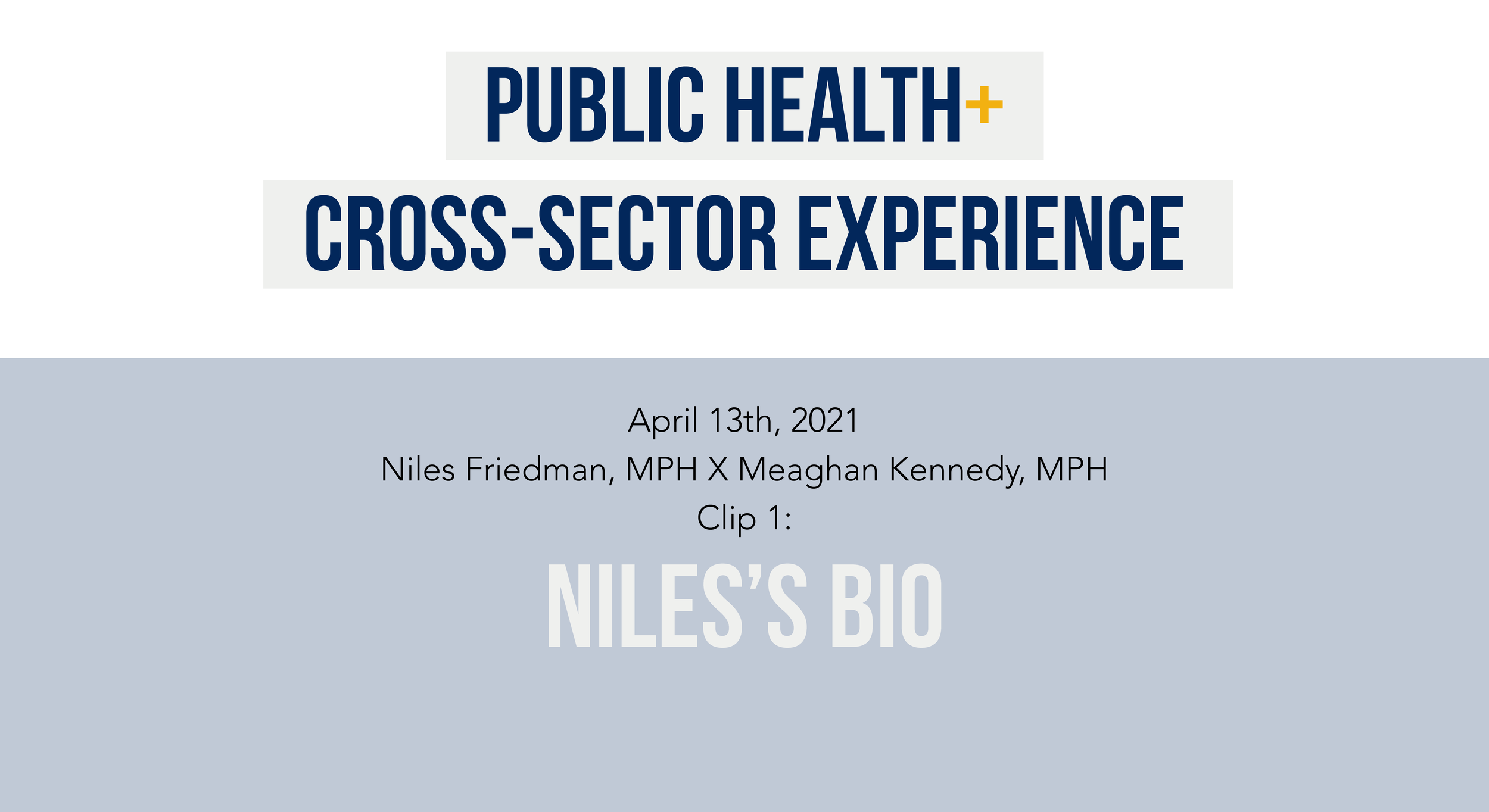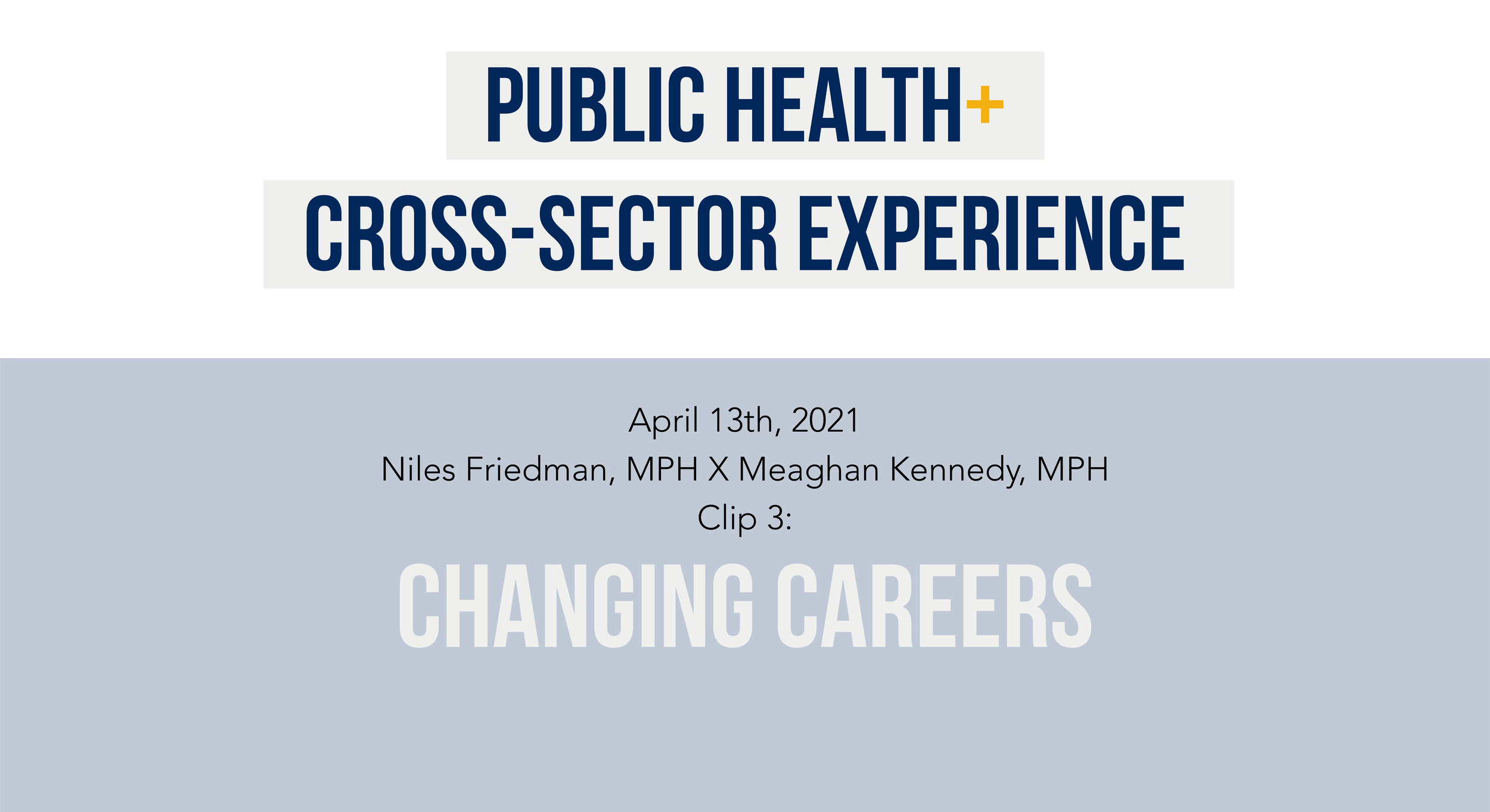On April 13th, Orange Sparkle Ball in collaboration with Rollins School of Public Health (RSPH) at Emory University hosted the last installment of ‘Season 1’ of their Public Health + Webinar series about the intersection of public health and other disciplines. We were thrilled for our founder, Meaghan Kennedy, MPH as she sat down with fellow RSPH alumni Niles Friedman, MPH to talk about their experiences in working across sectors.
Throughout this series, it’s been a recurring theme that different industries need to break down the barriers that separate them in order to achieve better results for everyone. But who is equipped to transcend these silos?
Niles Friedman is the perfect example of someone who has challenged perceptions of what can and should be done with a public health degree. After graduating with his MPH, he entered the healthcare consulting field. By working with firms like Deloitte and The Advisory Board Company he was able to create a strong foundation of experiences that would serve him throughout his career.
After approximately 10 years in the consulting field, Friedman left for a startup based in South Africa. At Broadreach Healthcare, Friedman was able to take on a global health angle with his work as the company focused on health systems strengthening priorities in rural HIV clinics in countries such as Nigeria, Chad, and South Africa. In addition, he launched a “commercial market development” business line focused on improving access to products (e.g., antiretrovirals, vaccines, and medical diagnostics) and services across developing countries. This work heavily pulled from skills developed across his private sector experience and there he was able to appreciate the value of working alongside corporate partners, government agencies, non-profit organizations, and even big pharmaceutical companies. By aligning everyone’s intent, these different groups and sectors were able to find shared value and deliver life-saving solutions.
Then in 2012, Friedman shifted his sights to work with President Barack Obama due to both his loyalty growing up in Chicago and his shared vision of America. Under the Obama administration, he worked with the Small Business Administration. During this time he was introduced to the “civic tech'' movement and FUSE Corps which eventually brought him to Sacramento to collaborate with the California Health and Human Service Agency (CHHS) to establish their first Office of Innovation. He worked as an Executive Advisor, to establish an environment that encourages innovation across the 13 CHHS departments and improves the delivery of services through the human-centered design approach, digital services, and insights from data and analytics. Despite his diverse experience, this work with CHHS was new for Friedman. He remembered thinking “I don’t know exactly what this is, but I want to be part of it.”
This brings us up to the last few years where he has worked as a Strategic Advisor with the CEO’s Office for Los Angeles County and delivered on functions such as technology-driven strategic planning and innovation in collaboration with the County’s 37 departments and hundreds of programs. He is a founding Executive Advisor with Star Insights, which has merged his years of experience in order to effectively advise federal, state, and local government agencies, foundations, non-profits, really anyone in the social impact space, in being able to operationalize their missions. In addition, he is a member of the Governments Team with the US Digital Response (USDR) and leads strategic partnerships with cities, counties, states, and nonprofits in their response to the COVID-19 crisis.
So how did Niles navigate across all these sectors? The way he sees it, public health is the perfect differentiator. It’s at the core of everything. Speaking to today's world, Friedman noted that “Public health is front and center… using [it] as a core tenant to rally around will be very powerful.” This applies to both a global discussion on breaking down silos, but also in personal career moves of changing sectors and industries.
The skills used in public health are very attractive across sectors. Niles walked us through taking a specific skill, say research, and then distilling the universal value of it. With research, it’s possible to reposition yourself as being able to distill large and complex information and communicate it, which is appealing to everything. This will also aid you as you work to find your unique value proposition. Be honest and ask yourself where your niche is. Beyond that, he reminded us to focus on making human connections and meeting people where they are. So often language, particularly industry jargon, can create a barrier and alienate people. Practicing humility, Niles reminds us, is crucial. He wrapped up the session with a valuable reminder to persevere even when this work across sectors seems overwhelming or incompatible:
“When you hit roadblocks, 1. Don’t take it personally 2. If you love to problem solve it’s actually the best environment”
If you’re interested in evolving your public health career and building cross-sector experience, here are a few examples of Niles’ work and some helpful resources that he recommends.
Civic Innovation + Public Sector
Civic Technology & GovTech + Public Sector
Thank you for helping us make ‘Season 1’ of Public Health + a success. We are looking forward to both a summer offering and starting next Fall, Season 2. Stay tuned!
Want to revisit past webinars or recaps? Find more here.
Writing by Sophie Becker, Design Strategist
Sophie is a design strategist at Orange Sparkle Ball. She is a recent graduate from RIT and holds a bachelor’s in industrial design and psychology. Her studies informed her interest in using design thinking to communicate abstract and complex ideas, particularly in public health.








